The idea of giftedness provokes very strong feelings among parents. When some parents hear the words “gifted” or “twice-exceptional (2e)” used to describe their child, they feel relieved. It might be the final piece of the puzzle regarding their high-maintenance child who simply doesn’t function like other children.
When other parents hear the term gifted they cringe or become defensive. They believe all children are gifted and that it is elitist to think that your child is “better” than others.
Debates rage online between people who believe all children are gifted and those who use the term to describe a significant neurological difference.
Prior to having a gifted child I didn’t think much about it. I had a profoundly gifted child in my first classroom, but other than that my experience was limited to my own childhood and being classified as gifted and talented. But having a gifted child who we eventually realized was 2e made me dive headlong into the world of giftedness in an effort to determine how to best meet her needs.
I’ve taught many children and I believe that every child is unique and brings something special to the world. But there is no doubt in my mind that not every child is gifted in the neurological sense we’re discussing in this series.
Nor is there any doubt in my mind that being gifted or 2e presents many challenges to children and their parents. This includes areas related to the Christian faith.
So what does thinking about gifted/2e from a Christian perspective include?
Giftedness Defined
Trying to distill gifted and 2e down to one post means I have to leave a lot out. For the purpose of this series, we’ll use this definition that sums up all that giftedness encompasses.
“Giftedness is ‘asynchronous development’ in which advanced cognitive abilities and heightened intensity combine to create inner experiences and awareness that are qualitatively different from the norm. This asynchrony increases with higher intellectual capacity. The uniqueness of the gifted renders them particularly vulnerable and requires modifications in parenting, teaching and counseling in order for them to develop optimally.” (Columbus Group, 1991)
There are many children who have advanced cognitive abilities, but do not have the heightened intensity. Those are smart kids who do well academically and achieve much in a traditional school setting. Those smart kids are not dealing with the heightened intensity (emotional, sensual, psychomotor, intellectual, and/or imaginational) that complicates the learning experiences of gifted children.
Gifted children are those who are simply wired differently than other children. Not better and not worse. But differently. Intensely differently.
Gifted does not mean automatic success and an easier road in school. It often means just the opposite as many gifted children do not function well in a classroom environment and their areas of heightened intensity hinder their ability to perform in academically desirably ways. They truly require modifications in parenting and learning.
2e Or Twice Exceptional
Within the group of gifted children is a smaller group called 2e or twice-exceptional. These are gifted children who also have a learning difference. In Caroline’s case, it is dysgraphia. For other children it could be dyslexia, auditory processing, Aspergers, sensory processing, or several other issues.
2e children have their own set of strengths and challenges. Twice-Exceptional Gifted Children: Understanding, Teaching, and Counseling Gifted Students gives the following two lists.
2e Strengths
- superior vocabulary
- highly creative
- resourceful
- curious
- imaginative
- questioning
- problem-solving ability
- sophisticated sense of humor
- wide range of interests
- advanced ideas and opinions
- special talent or consuming interest
2e Challenges
- easily frustrated
- stubborn
- manipulative
- opinionated
- argumentative
- sensitive to criticism
- inconsistent academic performance
- difficulty with written expression
- lack of organizational and study skills
- difficulty with social interactions
Reading through these lists makes it easy to see why a 2e child does not normally fit into a traditional classroom or, for the purpose of this series, a traditional church setting. A 2e child requires modifications in parenting and education.
What About Spiritual Gifts?
In the faith context, gifted is not referring to spiritual gifts. It is a different kind of gifting. The Bible tells us that every redeemed person receives at least one spiritual gift from the Holy Spirit for the building up of the body of Christ. But not every Christian is gifted in the neurological sense.
Will spiritual gifts and neurological giftedness overlap? Probably for some, but not necessarily. Only time will tell. Giftedness in a child is often evident from a very early age even though the parents might not recognize it until later. Looking back, we can clearly see Caroline’s giftedness in the first few weeks even though we didn’t realize it then. (We were too sleep deprived!) I have zero doubts about her giftedness now.
But at this point, I have no idea what her spiritual gifts might be. Time and the Holy Spirit will reveal that. Once we become more aware of her spiritual gift(s), we’ll look for ways to guide her in that area just as we do her giftedness and asynchronous development.
Thinking About Giftedness From A Christian Perspective
So how do we think about giftedness from a Christian perspective? How do we talk with our children about the fact that they were created gifted by God? I do not profess to have all the answers to this. But here is what I’m thinking.
Parents with a neuro-typical child might think that having a gifted child is a blessing that makes for an easy childhood. It is, in fact, just the opposite. I have yet to meet a parent of a gifted child who said it was even remotely easy. Determining how to effectively deal with the emotional intensity of a gifted toddler alone is enough to break the strongest parent.
So while some people might automatically classify giftedness as a blessing, often the child and parents struggle to see it that way. Does it feel like a blessing when:
- you don’t fit in with your peers because of asynchronous development so you speak and think like a teenager, play like an eight year old and struggle to write like a five year old?
- you struggle with intense emotions that overwhelm you?
- you feel like you have something wrong with you because your mind works so differently than those around you?
- you struggle with math or writing so that you can’t keep up with other children your age even though you are far beyond them in other areas?
- it is difficult to go out in public and do the most basic things because the sounds, smells and people overwhelm you?
I don’t think we’ve ever referred to Caroline’s giftedness as a blessing. I see it more as a challenge she will have to navigate in her life with God’s help rather than a blessing.
I do tell Caroline that I believe God created her as a unique individual and that He has purposes for her creativity, imagination, sensitivity and all of the other wonderful, intense aspects of her personality. I remind her that not everyone has the abilities she has and that they can be used to bless God and other people in her life.
I am thankful that because of my own struggles related to being gifted I can empathize with some (but not all) of her struggles. More importantly, I point her to Jesus, often praying with her when she is struggling with something. I am thankful that she will ask me to pray for her when going through a tough time.
I believe in God’s sovereignty and I trust that God has a good plan for my child even when the way is not clear at all from my perspective. I can see how He has worked time and again in my own life, marriage, friendships, and professional life. Because Caroline was an answer to many years of prayer and waiting, I believe He created her at this specific time for a purpose and He cares more for her than I ever could. I don’t know what those plans are, but I will remind her (and myself) that God works all things out for good for His children.
I choose to walk in faith each day, asking God for the wisdom and discernment to parent my gifted child. Will I have the answer to her every question and heartache? Of course not. But the Lord will care for her when I cannot. He knit her together in my womb and He will order her days because of the work He accomplished on the cross on her behalf.
Begin Understanding Your Child With My Short Ebook – Available Right Here in My Shop

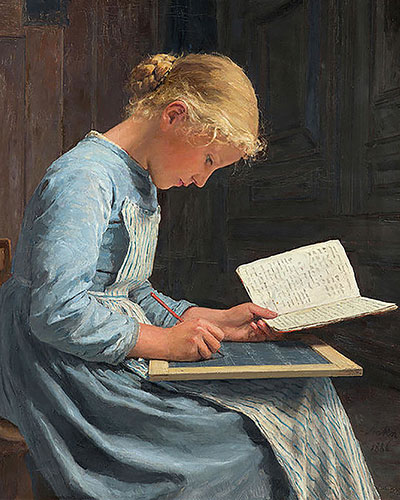

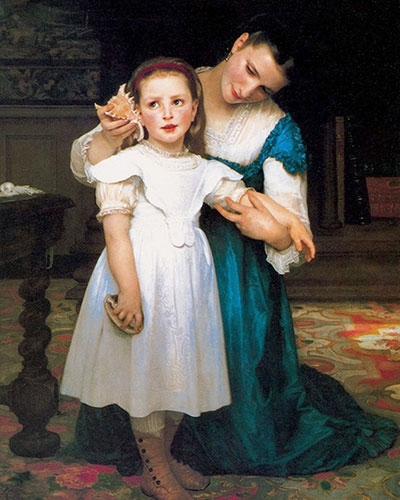

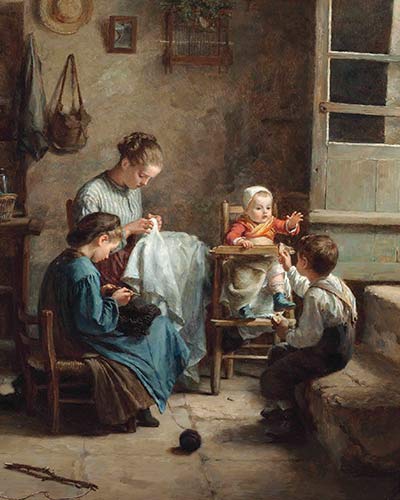


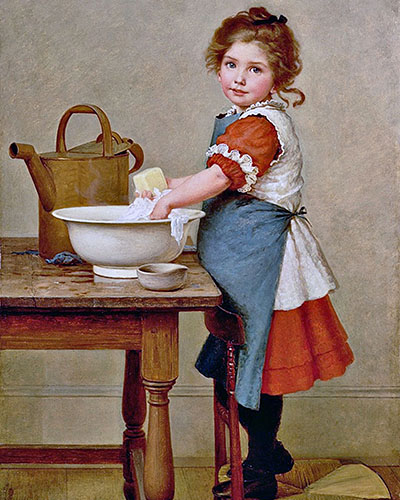


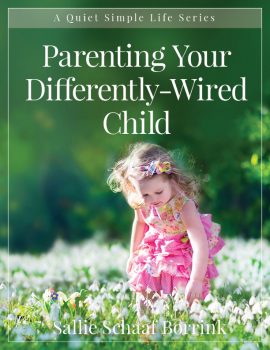






Hi Sallie,
You did not mention IQ tests, and I’ve been thinking that although two of my children do not “officially” meet the IQ cutoff for gifted, they clearly display every characteristic you mentioned above. I believe they are 2e children (one has ADHD, dysgraphia, and social anxiety, the other has ADHD, dyslexia, and probably auditory processing disorder), and I believe their learning differences pulled their scores down. One of my children, who is older (16) does meet the gifted “cutoff”, but she does not have any learning differences although she does suffer from OCD. Have you read anything about the accuracy of IQ testing in identifying gifted children? I have another daughter, 18, who is very smart and does very well in school; I do not believe she is gifted, however. I can just tell the difference. I am really excited about this series as my youngest, 8, (also named Caroline) is really struggling with church. She does not want to go at all, but loves it when I read to her from the Bible and asks questions and articulates spiritual truths in a way I would not expect from a child her age. Thanks again for this series!
Emma
Hi Emma!
Thank you for your comment! I haven’t read much at all about IQ tests. Since something like that isn’t in our budget, we’ve just had to go on our own observations and what we can learn from reading about these topics. I mentioned in another post recently that the local school district wouldn’t even test Caroline for the gifted and talented program unless she was enrolled (which I find incredibly annoying considering how much we pay in property taxes to live in this school district).
I have read many stories from parents who have a 2e child and had to fight (sometimes for years) to get accommodations made for their child. There is a significant lack of understanding about gifted and especially 2e among classroom teachers and even administrators. I don’t really fault the teachers. They didn’t receive instruction on it in college and it’s the least of their concerns when they have so much on their plate.
I hope you’ll share what you’ve learned too during the series!
Warmly,
Sallie
I just wanted to mention that not all kids that are gifted have an advanced vocabulary. You mention that your daughter has dysgraphia, which is a learning disability related to math and number sense. I have noticed that while working with supporting families with autism that most of the girls struggle with math and many of them display symptoms of dysgraphia.
Anyway….I wanted to mention that there are children who are gifted that do not have an advanced vocabulary. I am just now beginning to understand this as my son is on the autism spectrum and has a language processing disorder. He is 9 and I have better conversations with some 4 year olds. His use of vocabulary is actually behind. This misconception that most children who are gifted have advanced vocabulary has hidden his giftedness.
Thank you for this series. My husband is a pastor and we have some concerns about how faith with interact with his giftedness. For the most part, it has been positive but, I can see some of the struggles coming as he is thinking about concepts that I did not have to come to terms with until college.
Kristin,
Thank you for your comment! And thank you for pointing out that not all gifted children have advanced vocabularies. The language processing disorder would mask his giftedness (thus putting him in the 2e camp). This is a good example of why gifted children sometimes struggle in school and experience so much frustration.
Just to clarify… Dysgraphia is a struggle with writing. I think you are thinking of dyscalcula which is a struggle with numbers/math.
Re: the hard questions… My next post is on dealing with the hard questions. 🙂
I came across your article on why you did not join Classical Conversations. I finished skimming the article and knew based on your explanation that it was clear that CC was a not a fit for us. But then, I decided to go back and click on this gifted/2e hyperlink because I wasn’t sure what that was or that it was MY child to a tee! I can’t believe that I’ve never come across this term in the almost 3 years we’ve been struggling with him. He has almost every single trait, it was as if I was reading a list of attributes for my son that I had written myself. It’s such a relief to realize that there are other parents that are dealing with these same struggles. I just wanted to thank you. Even though I generally hate the idea of ‘labeling a child’ I feel like being able to give a name to what you’re dealing with really helps. Like when we finally got an official diagnosis of sensory processing disorder, it was so much easier for me to accept that what we were dealing with was a neurological issue, not a behavioral issue. I really think having this label in my head will help me to remember that these aren’t flaws, these are God’s design and that He’s equipped me to help His design flourish! Thank you!